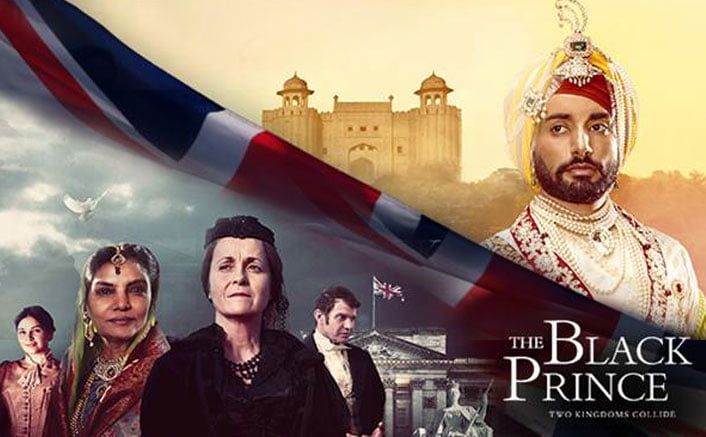“The Dark Saga of the Last Sikh Maharaja”

“The Black Prince” is a historical drama chronicling the life of Maharaja Duleep Singh, the last king of the Sikh Empire and son of the legendary Maharaja Ranjit Singh. The film explores Duleep Singh’s journey of self-discovery during his exile in England, offering a poignant glimpse into an often-overlooked chapter of Sikh history.
This film may not cater to casual moviegoers seeking light entertainment or those unfamiliar with Sikh history. However, for audiences who appreciate thought-provoking cinema and have an interest in this historical period, “The Black Prince” offers a unique perspective. It’s worth noting that the first forty minutes of the film progress at a deliberately slow pace, which may test the patience of some viewers. Those willing to invest in this meticulous storytelling will find a rewarding experience in this piece of meaningful cinema.
Director Kavi Raz draws inspiration from Navtej Sarna’s novel “The Exile” and other historical accounts to craft his narrative.
The story begins with Duleep Singh (portrayed by Satinder Sartaaj) living in England under the guardianship of Queen Victoria (Amanda Root). After gaining permission to visit his long-lost mother, Maharani Jinda (Shabana Azmi), Duleep Singh’s life takes a dramatic turn. Raised as a Christian and fully assimilated into English culture, he suddenly confronts the truth about his heritage – his status as the rightful heir to the Lahore Darbar and the cunning machinations that led to the British annexation of the Sikh Empire.
Following his mother’s death, Duleep Singh vows to reclaim his throne and restore the Sikh Empire. This revelation sets him on a tumultuous path, grappling with cultural identity and attempting to reconnect with his roots. His journey takes him to Paris, the United States, and Russia as he seeks allies in his fight against British rule in India. However, his efforts are continually thwarted by British authorities who fear the resurgence of the once-unconquerable Sikh Empire.
The film portrays Duleep Singh’s relentless struggle to return to his homeland and his ultimate tragic fate – dying impoverished in a Parisian hotel. Through this narrative, “The Black Prince” offers a compelling exploration of identity, cultural displacement, and the lasting impact of colonialism on individuals and nations alike.
For the average viewer, this story could have been an engaging historical journey if it had managed to hold undivided attention for its 118-minute runtime.
Unfortunately, Raz’s screenplay falls short of this feat. The opening sequence, where Maharani Jinda narrates the past to Duleep, is particularly tedious and sluggish. Despite the director’s efforts to intersperse flashbacks within the narration, the exposition feels burdensome rather than impactful.
Shabana Azmi’s stellar performance attempts to breathe life into the dull storytelling.
Her flawless delivery of satirical lines, expressing anger towards the British invaders, provides fleeting moments of relief. However, these instances are too rare to salvage the overall pacing. It’s only after Maharani Jinda’s death that the story gains momentum, painting a somber picture of Duleep’s helplessness.
Following the slow start, the director abruptly accelerates the pace, causing important sequences to pass by too quickly. The film notably avoids exploring the complexities of Duleep’s relationships with his two wives. Questions about his decision to remarry while planning a rebellion in Paris remain unanswered. This omission raises uncomfortable questions about Duleep’s character and his treatment of his wives and children.
The film’s strongest element is its climax.
We see the last Maharaja of the Sikh Empire, who never ruled his kingdom, lying frail in a Parisian hotel room. Despite his helplessness, he remains high-spirited, prophesying India’s eventual freedom from British rule. A voiceover informs us that the Maharaja was buried in a foreign land, against his faith and his wish to be cremated in his homeland according to Sikh rituals. The struggle to repatriate his remains continues to this day.
Shabana Azmi emerges as the film’s saving grace. Despite her brief appearance, she leaves a lasting impact. While she occasionally struggles with Punjabi pronunciation due to the formal translation of dialogues, her performance remains compelling. Satinder Sartaaj, in his debut role, makes his presence felt but lacks the nuance required for such a complex character. His expressions remain consistently gloomy, failing to reflect the changing circumstances of the story.
Amanda Root delivers an adequate performance as Queen Victoria, while Jason Flemyng shines in his emotional portrayal of Dr. Login, Duleep Singh’s caretaker. Sartaaj excels in his familiar territory as a lyricist and singer. His song “Dardan Wala Desh” is likely to evoke nostalgia among the Punjabi diaspora. The music by Prem and Hardeep is another highlight of the film.
Cinematographer Aaron C. Smith captures breathtaking visuals of museums, palaces, and monuments, giving each frame an antique feel.
The candlelit scenes imbue the atmosphere with artistic flair. However, the editing could have been sharper, and the overall feel of the film often resembles that of a television series.
Produced on a substantial budget of $5 million and released in English, Hindi, and Punjabi, “The Black Prince” ultimately falls short of its high expectations. Nevertheless, for those interested in the little-known journey of the last emperor of the great Sikh Empire and willing to endure its slow pace, this unique cinematic experience may still be worthwhile.
Deep Jagdeep Singh is a freelance journalist, Screenwriter and Lyricist. http://www.facebook.com/deepjagdeepsingh
For more entertainment join us on Facebook, Twitter and WhatsApp
Leave a Reply